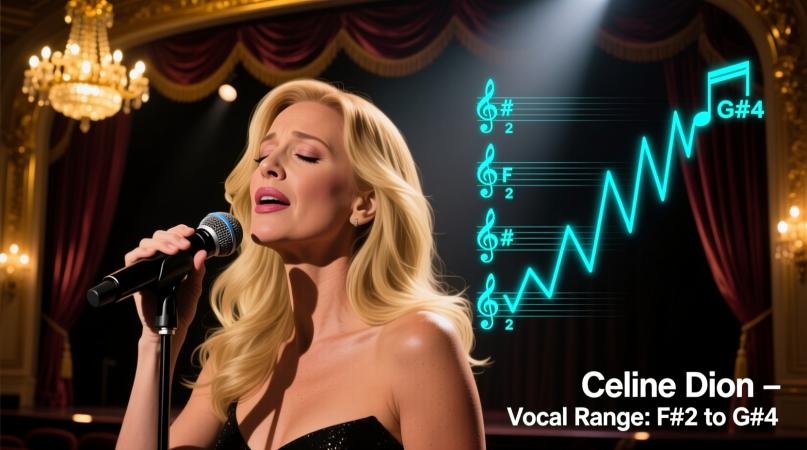
Few artists embody vocal power and emotional delivery quite like Celine Dion. Whether it’s the haunting My Heart Will Go On or the powerhouse notes in All By Myself, her voice has captivated generations. Naturally, fans often wonder: “What is Celine Dion’s vocal range?”
The answer isn’t as straightforward as one number. Different analysts, critics, and fans report slightly different spans. Let’s break down the facts, the myths, and why her range matters less than how she uses it.
Understanding Vocal Range
Vocal range refers to the lowest and highest notes a singer can produce.
- Everyday singers: ~1.5–2 octaves
- Trained professionals: 3–4 octaves
- Rare cases: 4+ octaves
Celine Dion is widely believed to have around three octaves, with some rare claims of extended highs beyond that. If you’d like to measure your own span, you can test your vocal range online and see how you compare to professionals.
What Sources Say About Celine Dion’s Range
Here are the most common claims:
- SingingCarrots: C3 – C6 (3 octaves).
- Superprof: B2 – C6 (≈3 octaves).
- Critic of Music: B♭2 – C6 – E6, possibly higher extensions.
- RangePlanet: B2 – D6.
- VocalView (Tumblr): C3 – C6 – B♭6.
Most reliable estimates fall in B2 to C6 territory. Some analyses push her highs up to E6 or B♭6, but those are debated.
Why the Numbers Don’t Always Match
Confusion comes from how analysts measure range:
- Studio vs. Live – Studio tracks may capture rare extremes, while live shows reflect her consistent span.
- Falsetto Inclusion – Some count falsetto or light head voice, others don’t.
- Fan vs. Expert Analysis – Fans sometimes overstate notes from harmonics or background layers.
- Career Longevity – Like all singers, her voice has evolved over decades.
Celine Dion’s Lowest Notes
Though known for her soaring highs, her low end deserves credit:
- B2 – Rarely documented, but cited in certain recordings.
- C3 – Common in her French repertoire.
- D3–E3 – Featured in Falling Into You and All By Myself.
Her low register adds warmth and versatility, giving her ballads depth.
Celine Dion’s Highest Notes
Celine isn’t a “whistle register” singer, but her highs are powerful:
- C6 – Frequently reached at the climax of All By Myself.
- E6 – Claimed in studio work.
- B♭6 – Reported by fans, though not universally accepted.
Her head voice carries strength, often cutting through orchestral arrangements with clarity.
Vocal Range in Numbers
Here’s how her range looks in frequencies:
| Note | Frequency (Hz) | Example Song |
|---|---|---|
| B2 | 123 Hz | Rare studio/lives |
| C3 | 130 Hz | Pour que tu m’aimes encore |
| A4 | 440 Hz | Standard ballad midrange |
| C6 | 1046 Hz | All By Myself |
| E6 | 1318 Hz | Reported in rare studio peaks |
That span equates to about three octaves (B2–C6, with extensions to E6).
Voice Type and Characteristics
Celine is best described as a lyric soprano.
- Tessitura (sweet spot): A3 – C5.
- Lower color: Contralto-like weight at B2–C3.
- High extensions: Soprano brilliance at C6+.
To put this into perspective, you can learn more about soprano voices and see how her tessitura compares.
Songs That Showcase Her Range
Her versatility shines across her catalog:
- “All By Myself” – Belts up to C6 with control.
- “My Heart Will Go On” – Balances midrange with high resonance.
- “Pour que tu m’aimes encore” – Demonstrates her lows.
- “It’s All Coming Back to Me Now” – Nearly three octaves in one track.
- “Because You Loved Me” – A3 to A5 span.
Comparison with Other Singers
| Singer | Approx. Range | Voice Type |
|---|---|---|
| Celine Dion | B2 – C6 (E6 disputed) | Lyric soprano |
| Whitney Houston | C3 – C6 | Soprano |
| Mariah Carey | B2 – G7 | Soprano (whistle) |
| Adele | B2 – C6 | Mezzo-soprano |
| Freddie Mercury | F2 – E6 | Tenor/Baritone |
This shows she stands alongside legends, not just in technical span, but in emotional delivery and consistency.
Myths About Her Range
- “Celine Dion has five octaves.” → No evidence. Realistic: ~3.
- “She lost her range.” → While her voice matured, she retains impressive flexibility.
- “Pure soprano only.” → She blends soprano brilliance with mezzo warmth.
Why Her Voice Is Special
Range is only one aspect. Celine’s uniqueness lies in:
- Consistency over decades
- Projection and power
- Emotional storytelling through phrasing
- Versatility across languages and genres
FAQs About Celine Dion’s Vocal Range
What is Celine Dion’s vocal range?
Around B2 to C6 (3 octaves), with disputed extensions to E6.
What is her lowest note?
Her lowest confirmed note is B2, though C3 is more common.
What is her highest note?
Her highest consistent note is C6, with rare claims of E6.
What voice type is she?
Generally classified as a lyric soprano.
Has her range changed?
Yes, with time, but her core tessitura remains intact.
Which songs highlight her extremes?
All By Myself (highs), Pour que tu m’aimes encore (lows).
